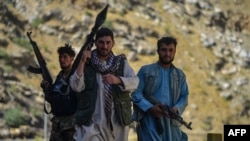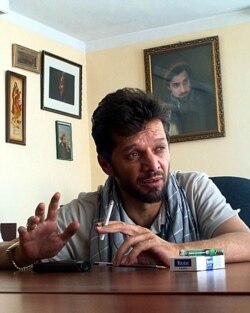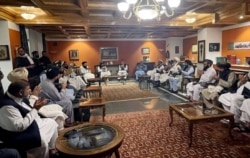A delegation from Panjshir, the last bastion of resistance against the Taliban in Afghanistan, held talks Thursday with a Taliban delegation in Charikar, the capital of neighboring Parwan province, to try to find a peaceful solution to their conflict.
Fahim Dashty, who is working closely in Panjshir with Ahmad Massoud, confirmed the meeting. Ahmad is the son of Ahmad Shah Massoud, the esteemed guerilla leader of the Northern Alliance, who was assassinated in 2001.
"There were some of the former ministers, some of the formers MPs (members of Parliament), not only from Panjshir, but from other provinces, too," Dashty said, when describing the composition of their delegation.
A Taliban source also confirmed the meeting on condition of anonymity because he was not an official spokesman for the group. He told VOA the Taliban delegation was led by Maulvi Amir Khan Mottaqi.
Dashty said the delegation-level meeting was the outcome of earlier efforts.
"There was a Taliban delegation at least two times in the last week, and even before that, as well as now, back-channel messages were going back and forth," he said. "The outcome of these meetings, as well as those messages, was to send a delegation from Panjshir, from the resistance, to meet Taliban officials."
Dashty also said the Taliban had ceased blocking routes to Panjshir valley "after one or a maximum of two days," and that supplies of food and water were continuing as usual.
On August 24, Amrullah Saleh, the first vice president in the administration of self-exiled President Ashraf Ghani, tweeted that the Taliban had blocked food and fuel from coming into Panjshir.
"The humanitarian situation is dire," Saleh tweeted. "Thousands of women & children have fled to mountains."
Saleh also accused the Taliban of abducting and using women and children as "shields to move around or do house search(es)."
Meanwhile, senior Afghan leaders, including former President Hamid Karzai and the head of Afghanistan's reconciliation council, Abdullah Abdullah, continued to engage the Taliban, hoping for their own version of a peaceful solution.
"Dr. Abdullah spoke to Ahmad last night and encouraged him to form a delegation and to adopt a logical approach to reach an understanding," an official on Abdullah's team told VOA.
The Taliban repeatedly have announced they want to form an inclusive government in Afghanistan.
A source told VOA that Karzai and Abdullah had proposed to take their talks with the Taliban and shift them to Doha from Kabul. A third leader, Hekmatyar, insisted on keeping the talks in Kabul.
Due to its geography and demography, conquering Panjshir by force is considered extremely difficult. The Taliban could not conquer Panjshir during their last rule in the 1990s. Eventually, al-Qaida-linked suicide bombers posing as journalists killed Ahmed Shah Massoud in an attack.
Dashty called on the international community to pressure the Taliban into entering meaningful negotiations and allow the establishment of a representative and participatory government that would ensure social justice and protect the rights of all Afghans.
He repeated his vow that if war was imposed on them, they would fight not just for Panjshir but "to fight from Panjshir for the rest of Afghanistan."


